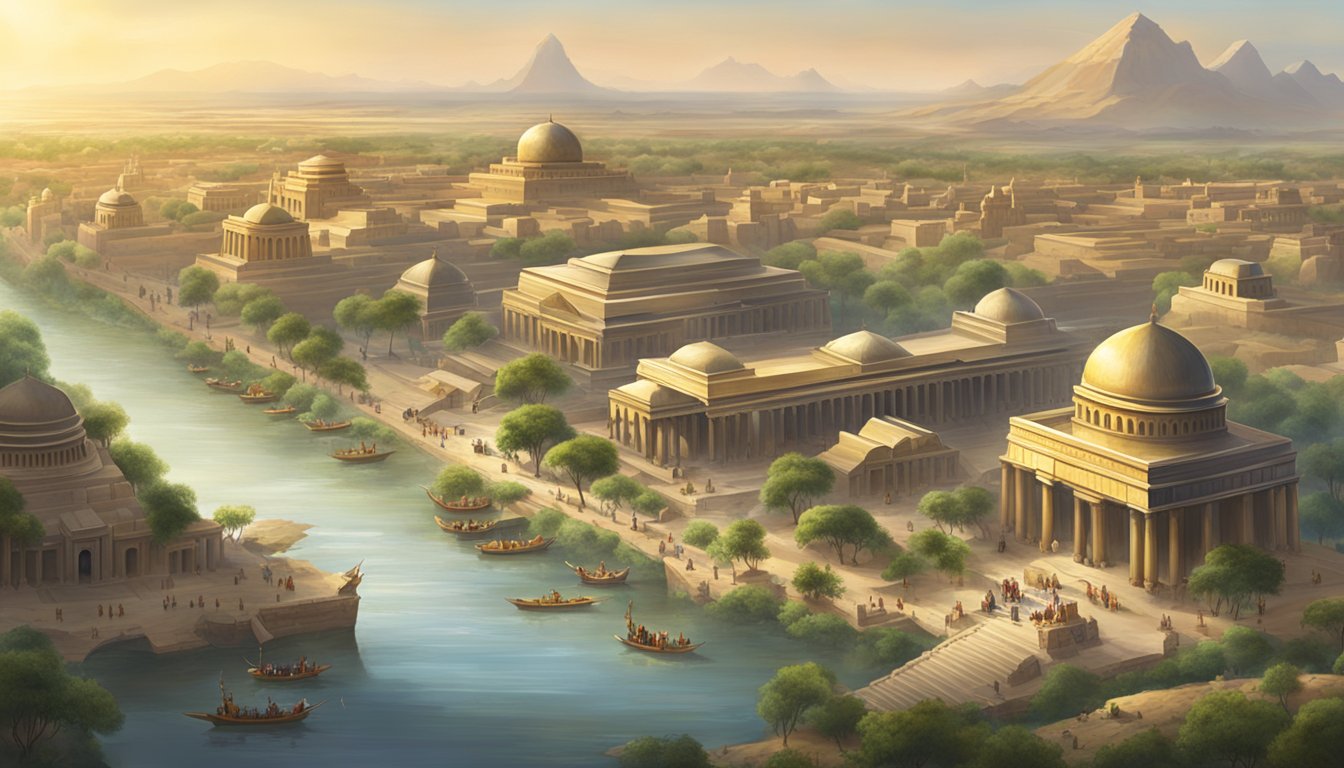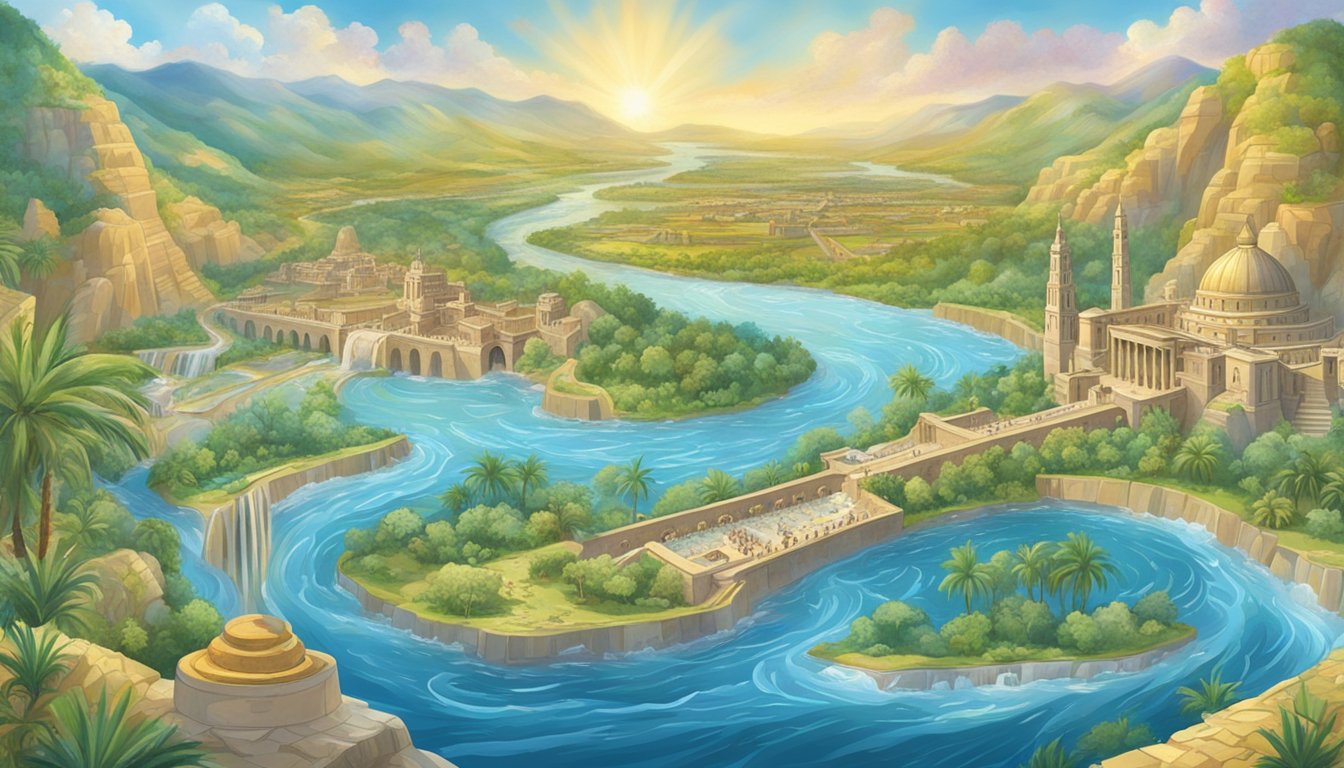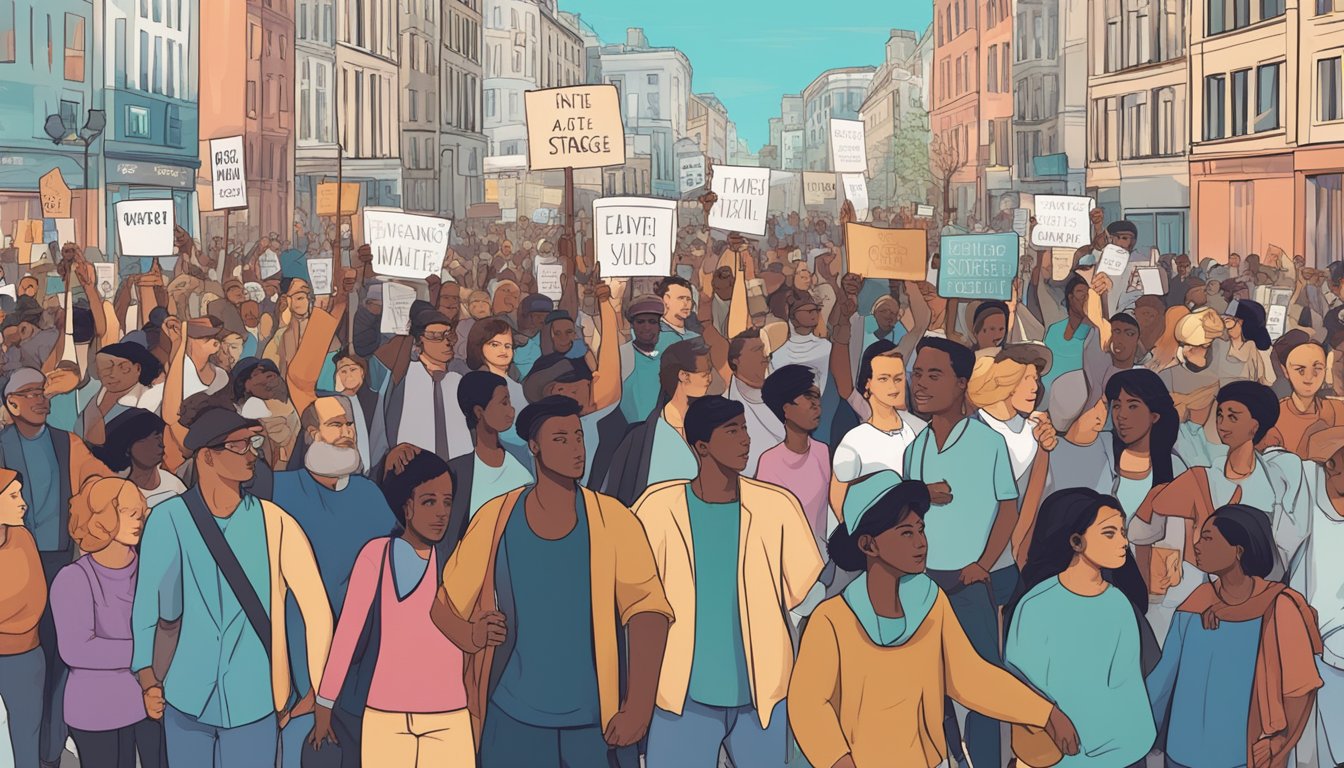Rivers of Babylon is a song that has been widely popular since its release in 1978. The song was originally written and recorded by the Jamaican reggae group, The Melodians, in 1970. It was later adapted by Boney M, a German disco group, and became an international hit. The song’s lyrics are adapted from the texts of Psalms 19 and 137 in the Hebrew Bible.


The song’s origins and religious significance have sparked a debate among listeners, with some claiming that it is a Christian song while others argue that it has roots in Rastafarianism. The song’s lyrics speak of the Israelites’ longing for their homeland, their memories of Zion, and their sadness at being forced to leave. These themes have been interpreted in different ways by various religious groups, leading to different opinions on the song’s religious significance.
Despite the controversy surrounding the song’s religious origins, Rivers of Babylon has become a cultural icon and has been covered by numerous artists in different genres and languages. The song’s popularity has transcended religious and cultural boundaries, making it a global phenomenon. In this article, we will explore the song’s history, lyrical analysis, cultural impact, religious significance, and controversies.
Key Takeaways
- Rivers of Babylon was originally written and recorded by The Melodians in 1970 and later adapted by Boney M.
- The song’s lyrics are adapted from the texts of Psalms 19 and 137 in the Hebrew Bible, leading to debates about its religious significance.
- Despite the controversy, Rivers of Babylon has become a cultural icon and has been covered by numerous artists in different genres and languages.
Historical Context


Biblical References
The song “Rivers of Babylon” is based on Psalm 137 from the Old Testament of the Bible. This psalm is a lamentation of the Israelites who were taken captive by the Babylonians after the Babylonian conquest of the Kingdom of Judah. The psalm describes the Israelites’ sadness and longing for their homeland, Zion, as they were forced to live in exile in Babylon.
Babylonian Exile
The Babylonian Exile was a period in Jewish history in which the Babylonians conquered the Kingdom of Judah and took the Israelites captive. This event is described in the Old Testament and is believed to have occurred between 597 BCE and 539 BCE. During this time, the Israelites were forced to live in Babylon and were not allowed to return to their homeland.
Jewish History
The Babylonian Exile is a significant event in Jewish history as it marked the end of the Kingdom of Judah and the beginning of the Babylonian captivity. The exile lasted for approximately 70 years and had a profound impact on Jewish culture and religion. The Israelites were forced to adapt to life in a foreign land and were exposed to new ideas and beliefs.
The Tigris and Euphrates rivers, which flow through modern-day Syria and Iraq, played a significant role in the Babylonian Exile. The Israelites were taken captive to Babylon, which was located on the banks of the Euphrates river. The rivers are also mentioned in the Bible as the location of the Garden of Eden.
In conclusion, “Rivers of Babylon” is a song that is deeply rooted in Jewish history and culture. The song’s lyrics speak to the Israelites’ longing for their homeland and their sadness at being forced to live in exile. The Babylonian Exile is a significant event in Jewish history and continues to be remembered and commemorated to this day.
Original Song by The Melodians
https://www.youtube.com/watch?v=BXf1j8Hz2bU&embed=true
Creation and Inspiration
The song “Rivers of Babylon” was originally written and recorded by Brent Dowe and Trevor McNaughton of the Jamaican reggae group The Melodians in 1970. The lyrics of the song are adapted from the texts of Psalms 19 and 137 in the Hebrew Bible. The song’s title is a reference to the Babylonian exile of the Jewish people in the 6th century BCE.
The song was produced by Leslie Kong, who was a well-known reggae producer in Jamaica at the time. The Melodians had previously worked with Kong and had a number of hits under his production. “Rivers of Babylon” was one of the most successful songs that they recorded with Kong.
Musical Composition
The song features a classic reggae rhythm with a catchy melody and beautiful harmonies. The lyrics of the song are sung in a Rastafarian style, which is a religious movement that developed in Jamaica in the 1930s. The Rastafarian movement is based on a belief in the divinity of Haile Selassie I, the former Emperor of Ethiopia.

The song has become a classic in the reggae genre and has been covered by many artists over the years. It has also been featured in a number of films and television shows. The success of the song is a testament to the talent of The Melodians and the enduring appeal of the reggae genre.
In conclusion, “Rivers of Babylon” is a classic reggae song that was written and recorded by The Melodians in 1970. The song’s lyrics are adapted from the texts of Psalms 19 and 137 in the Hebrew Bible, and the song features a classic reggae rhythm with a catchy melody and beautiful harmonies. The song has become a classic in the reggae genre and has been covered by many artists over the years.
Boney M’s Adaptation
https://www.youtube.com/watch?v=FZ-Vmru_kJk&embed=true
Boney M’s version of “Rivers of Babylon” was released in 1978 and became a global success. The song was produced by Frank Farian, who discovered The Melodians’ version of the song during a trip to Jamaica. Farian decided to produce a new version of the song, enlisting the help of singer Liz Mitchell, who provided powerful vocals to the new version of the song.
Chart Success
“Rivers of Babylon” accomplished the very-rare feat of selling over two-million copies in the United Kingdom. Throughout the years, it has remained one of the 10 best-selling songs ever in that country. Accordingly, “Rivers of Babylon” went on to top the UK Singles Chart. At the end of 2007, Boney M was the only act to have two singles in the UK all-time Top 10 best sellers list. At that date, this song was the fifth top-selling single of all time in the UK and Boney M’s only number one hit in the United States.
Musical Style
Boney M was a Germany-based disco band that was popular in the late 1970s. The band’s adaptation of “Rivers of Babylon” featured a disco beat and a catchy chorus that made it a hit with audiences around the world. The song’s upbeat tempo and catchy lyrics made it a favorite on the dance floor, and it remains a popular song to this day. “Rivers of Babylon” was included on Boney M’s album “Nightflight to Venus,” which was a commercial success, selling over a million copies and being certified platinum in the United States.
Overall, Boney M’s adaptation of “Rivers of Babylon” was a massive hit that helped to establish the band as one of the most popular disco acts of the late 1970s. The song’s catchy chorus and upbeat tempo made it a favorite on the dance floor, and it remains a classic today.
Lyrical Analysis
https://www.youtube.com/watch?v=wmGju-M-pso&embed=true
The lyrics of “Rivers of Babylon” have their roots in the Book of Psalms, specifically the 137th chapter. The themes of longing and hope for Jerusalem and Zion are prominent throughout the song. The lyrics describe the exiled Israelites’ feelings of sadness and nostalgia for their homeland while being held captive in Babylon. The song’s opening lines, “By the rivers of Babylon, there we sat down, yea, we wept when we remembered Zion,” set the tone for the rest of the song.
Themes of Longing and Hope
The song’s lyrics express a deep longing for Jerusalem and Zion, which are symbolic of the Jewish people’s homeland. The lyrics speak of hanging their harps and refusing to sing the Lord’s song in a foreign land, indicating their reluctance to forget their heritage and assimilate into Babylonian culture. The lyrics also express hope for a return to Jerusalem and a restoration of their way of life. The song’s chorus, “Let the words of our mouths and the meditation of our hearts be acceptable in thy sight, oh Lord,” is a direct reference to the Lord’s Prayer, which emphasizes the importance of forgiveness and redemption.
Religious Imagery

The song’s lyrics are rich in religious imagery, drawing heavily from the Bible. The reference to the rivers of Babylon is a direct allusion to Psalm 137, which describes the exiled Israelites’ feelings of sadness and longing for their homeland. The lyrics also reference the Lord’s song, which is likely a reference to the Psalms, and the harps that the Israelites hung up, which were likely used in worship. The song’s chorus, which ends with “the Lord’s prayer,” is a direct reference to the Christian prayer that emphasizes the importance of forgiveness and redemption.
Overall, while “Rivers of Babylon” is not a Christian song in the traditional sense, it draws heavily from Christian and Jewish religious imagery and themes. The song’s lyrics express a deep longing for Jerusalem and Zion, as well as hope for a return to their homeland. The use of religious imagery and references to the Bible give the song a spiritual and emotional depth that has resonated with listeners for decades.
Cultural Impact
https://www.youtube.com/watch?v=GHDVErAq19A&embed=true
Influence on Music
“Rivers of Babylon” has had a significant impact on music across generations and cultures. The song’s inspiration comes from Psalm 137, a Hebrew poem that tells the story of the Babylonian exile. The lyrics of the song describe the pain and emotions of the Israelites who were taken captive and forced to live in Babylon.
The song has become an anthem for those who have suffered similar fates and has been covered by many artists, including The Melodians, who first recorded it in 1970. It has also been featured in various films and TV shows, including “The Harder They Come” and “Turn! Turn! Turn!”.

The song’s influence can also be seen in U2’s hit “One”, which features a sample from “Rivers of Babylon” in its intro. The song has become a symbol of hope and perseverance for those who have faced difficult times.
Use in Media
“Rivers of Babylon” has been used in various media, including films, TV shows, and commercials. Its use in media has helped to introduce the song to new audiences and has helped to keep it relevant across generations.
For example, the song was featured in the film “The Harder They Come”, which helped to popularize reggae music in the United States. It has also been used in various commercials, including a 2018 commercial for Coca-Cola.
Overall, “Rivers of Babylon” has had a significant cultural impact and has become a symbol of hope and perseverance for those who have faced difficult times. Its use in media has helped to keep the song relevant across generations and has introduced it to new audiences.
Religious Significance
https://www.youtube.com/watch?v=puuxi6P6Oq0&embed=true

The song “Rivers of Babylon” has a strong religious significance, drawing from various sources in the Bible and other religious texts.
Christian Interpretations
Many Christians interpret the song as a reference to the Babylonian exile of the Jewish people, as described in the Hebrew Bible. The song’s lyrics are based on Psalm 137, which describes the lamentations of the Jewish people in exile following the Babylonian conquest of Jerusalem in 586 BC. The psalm expresses the Jews’ longing to return to their homeland, and their despair at being surrounded by unfamiliar surroundings.
Some Christians also see the song as a metaphor for the struggles of the faithful in a fallen world. The lyrics speak of the “wicked” who have “enslaved” the Jews, and the longing to “sing the Lord’s song in a strange land.” This can be interpreted as a call to remain faithful to God in the face of adversity, and to trust in His ultimate plan for salvation.
Rastafarian Influence
The song has also been embraced by the Rastafarian movement, which sees Babylon as a symbol of oppression and injustice. Rastafarians believe that the Babylonian system of government and society is responsible for the suffering of black people throughout history, and that the only way to achieve true freedom is to reject Babylon and embrace the ideals of Zion.
In Rastafarian theology, Zion represents a spiritual homeland where black people can live in peace and harmony with nature. The movement draws heavily on the Bible, especially the Old Testament prophets, and sees itself as a continuation of the struggle of the Jewish people against Babylonian oppression.

Overall, the religious significance of “Rivers of Babylon” is complex and multifaceted. The song draws on a variety of sources in the Bible and other religious texts, and has been interpreted in many different ways by people of different faiths and backgrounds.
Global Reception

Adaptations and Covers
Since its release in 1978, “Rivers of Babylon” by Boney M has been covered by numerous artists from around the world. The song has been adapted into various languages, including French, German, Spanish, and Italian. In the United States, the song reached number 30 on the Billboard Hot 100 chart and number 96 on the R&B chart. It was also a hit in the United Kingdom, where it spent five weeks at number one on the UK Singles Chart.
One of the most notable adaptations of “Rivers of Babylon” is the version recorded by Sister Janet Mead in 1978. Her version, which features a rock arrangement and religious lyrics, became a hit in Australia and the United States. The song reached number three on the Australian singles chart and number four on the Billboard Hot 100 chart. Mead’s version is often referred to as a Christian adaptation of the song, as it features lyrics from Psalm 137 and references to the Bible.
International Recognition
“Rivers of Babylon” has become a global phenomenon, with its catchy reggae beat and uplifting lyrics resonating with audiences from all over the world. The song has been featured in numerous films, television shows, and commercials, and has been used as a political anthem by various groups.

In France, the song was popularized by the group Black Roots, who recorded a French version titled “Les Racines du Ciel” in 1984. The song became a hit in France and helped to introduce reggae music to a wider audience in the country.
In South Africa, “Rivers of Babylon” has become a popular song at sporting events, with fans often singing along to the catchy chorus. The song has also been used as a political anthem in the country, with its lyrics of hope and freedom resonating with the anti-apartheid movement.
Overall, “Rivers of Babylon” has become a beloved song around the world, with its message of hope and freedom transcending cultural and linguistic barriers. Its popularity and enduring legacy are a testament to the power of music to bring people together and inspire positive change.
Controversies and Criticisms

Cultural Appropriation
One of the controversies surrounding “Rivers of Babylon” is the issue of cultural appropriation. Boney M, a German disco group, covered the song, which is originally a Rastafarian hymn based on Psalm 137. The Rastafarian movement is a religious and cultural movement that originated in Jamaica and is closely associated with reggae music. Some Rastafarians believe that the song has been appropriated by non-Rastafarians and turned into a pop hit, thereby diluting its original meaning and significance.
Misinterpretations

Another criticism of the song is that it has been misinterpreted by some listeners. The lyrics of “Rivers of Babylon” refer to the Babylonian exile of the Israelites and their longing for their homeland. However, some listeners have interpreted the song as a celebration of marijuana use or a critique of police oppression. While these interpretations are not necessarily incorrect, they do not fully capture the original meaning and context of the song.
It is important to note that the term “Babylon” in Rastafarian culture refers to oppressive Western society, rather than the ancient city of Babylon. This can lead to confusion and misinterpretation of the song’s lyrics by those who are not familiar with Rastafarian culture. Additionally, the use of the term “Babylon” in the song has been criticized for perpetuating negative stereotypes about the Middle East and its people.
Despite these criticisms, “Rivers of Babylon” remains a beloved song that has resonated with audiences around the world. Its catchy melody and uplifting lyrics continue to inspire listeners, regardless of their cultural or religious background.
Social and Political Themes

The song “Rivers of Babylon” is not a Christian song, but it does have social and political themes that are rooted in the Bible. The lyrics of the song are derived from the Book of Psalms, specifically the 19th and 137th chapters. These chapters describe the exile and oppression of the Israelites in Babylon and their longing for freedom and redemption.
Exile and Oppression

The first few verses of the song describe the Israelites’ exile in Babylon and their sorrow at being separated from their homeland. The line “By the rivers of Babylon, there we sat down, ye-eah we wept when we remembered Zion” (source) captures the pain and longing that the Israelites felt during their captivity. The song also references the oppressors who held the Israelites captive, describing them as “wicked” and calling for their downfall.
Freedom and Redemption
Despite the Israelites’ difficult circumstances, the song also speaks to their hope for freedom and redemption. The line “Let the words of our mouth and the meditation of our heart be acceptable in thy sight, oh Jah” (source) suggests that the Israelites are still faithful to their God and believe that he will deliver them from their captivity. The song also references the Lord’s song, which is a symbol of hope and joy for the Israelites.
In conclusion, while “Rivers of Babylon” is not a Christian song, it does have social and political themes that are rooted in the Bible. The song speaks to the Israelites’ exile and oppression in Babylon, as well as their hope for freedom and redemption.
Legacy and Influence on Modern Music
https://www.youtube.com/watch?v=l3QxT-w3WMo&embed=true
Cover Versions
“Rivers of Babylon” has been covered by numerous artists over the years, cementing its place as a classic in the music world. The most famous cover was by German disco group Boney M in 1978, which became a worldwide hit. The lead singer of Boney M, Liz Mitchell, brought a unique Caribbean flavor to the song with her soulful vocals. The song’s popularity led to it being covered by other artists, such as Sublime, Linda Ronstadt, and Olivia Newton-John.
Inspirations for New Artists

The song’s influence on modern music extends beyond cover versions. Many artists have been inspired by “Rivers of Babylon” and its reggae sound. The song’s lyrics, which are based on the Book of Psalms, have also inspired new artists to incorporate biblical themes into their music. For example, hip-hop artist Kanye West sampled “Rivers of Babylon” in his song “Ultralight Beam” and included biblical references throughout the album.
The song’s legacy has also been felt in the Caribbean music scene, where reggae music has its roots. “Rivers of Babylon” influenced the development of reggae music, and its popularity helped introduce the genre to a wider audience. Today, reggae music is a global phenomenon, with artists like Bob Marley and Damian Marley continuing to carry the torch.
In conclusion, “Rivers of Babylon” has had a lasting impact on the music world, inspiring new artists and influencing the development of reggae music. Its timeless message of hope and longing for home continues to resonate with listeners today.
Frequently Asked Questions
https://www.youtube.com/watch?v=Ahrn-QnYsLs&embed=true
What is the religious significance of ‘Rivers of Babylon’?
‘Rivers of Babylon’ is a song that draws inspiration from Psalm 137 in the Bible. The psalm describes the exiled Israelites’ longing for their homeland while in captivity in Babylon. The song’s lyrics portray the yearning and hope for freedom and a return to their homeland.
Can ‘Rivers of Babylon’ be classified as a Christian hymn?
While the song’s lyrics draw from the Bible, ‘Rivers of Babylon’ is not typically classified as a Christian hymn. The song has been performed by a variety of artists and has become a popular cultural reference.
What are the biblical references in ‘Rivers of Babylon’?
The lyrics of ‘Rivers of Babylon’ reference Psalm 137 in the Bible, specifically the first four verses. The song describes the Israelites’ longing for their homeland while in captivity in Babylon and their hope for freedom and a return to their homeland.
Is ‘Rivers of Babylon’ associated with a specific religious tradition?
While the song’s lyrics draw from the Bible, ‘Rivers of Babylon’ is not typically associated with a specific religious tradition. The song has been performed by a variety of artists and has become a popular cultural reference.
What is the historical context behind the lyrics of ‘Rivers of Babylon’?
The historical context behind the lyrics of ‘Rivers of Babylon’ is the Babylonian captivity of the Israelites in the 6th century BCE. The song describes the Israelites’ longing for their homeland while in captivity in Babylon and their hope for freedom and a return to their homeland.
How does ‘Rivers of Babylon’ relate to the Psalm mentioned in the Bible?
The lyrics of ‘Rivers of Babylon’ draw directly from Psalm 137 in the Bible, specifically the first four verses. The song describes the Israelites’ longing for their homeland while in captivity in Babylon and their hope for freedom and a return to their homeland.












